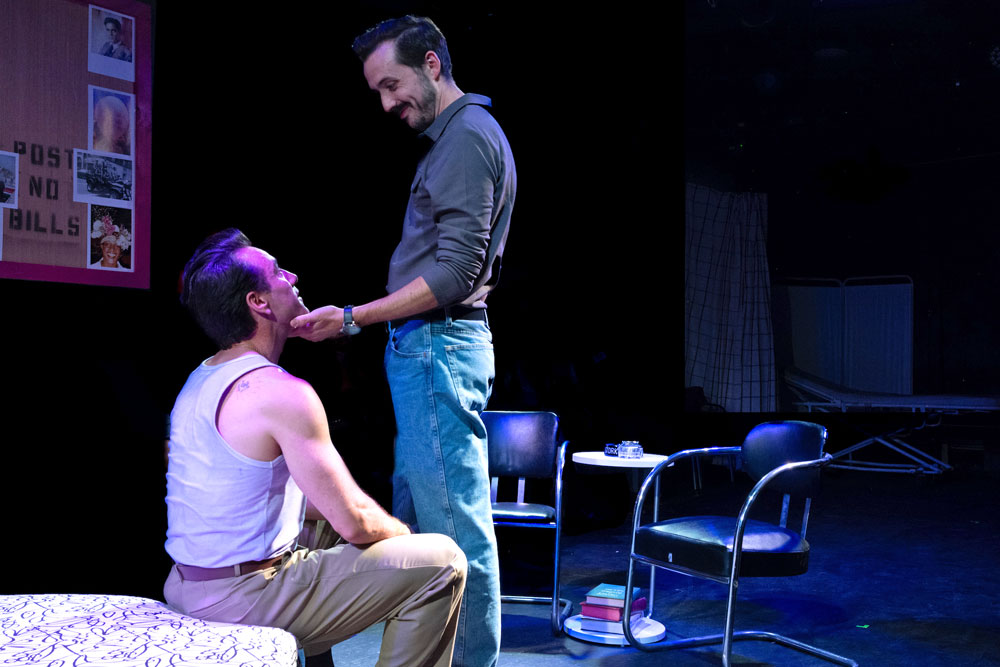The constellation of the elite is expanding in the American galaxy of exceptional playwrights.
Although he has been creating or interpreting as either an actor or a storyteller since the 70’s, Eugene Lee has attained a new high in writing excellence with his East Texas Hot Links. An amazing mix of raw reality and Shakespearean lyricism, the play manages to move fast and tell a rich story about a segment of black America we don’t hear nearly enough about. The true mark of a great play or story of any kind rests on its ability to sting with truth. The kind that elicits that tiny gasp of recognition and surprise. Lee accomplishes this as well as a Sophocles or an Arthur Miller or an August Wilson; to whom he’s often compared. Linking the two is understandable. The sheer beauty of the language each uses and the ever-present grit to which each pays homage binds them. But Lee’s style is rooted in different soil.
East Texas and Wilson’s Pittsburg certainly shared a common enemy. Virulent racism was as familiar in the backwoods of East Texas as it was Pittsburg’s concrete streets. In both places it was immovable, rigid, unsparing. If there is a difference it is one of style rather than effect. Where it might appear slightly veiled in Pittsburg; its East Texas guise is much more raw, open and brutish. Escaping the suffocation of that most oppressive form of racism is the engine that drives the action in East Texas Hot Links. Populated by some of the most captivating characters you’ve ever encountered on the set of a stage, the audience is reminded of the breath of the American experience and of how magnanimity can rise in the face of deadly challenge. One that’s made more precarious with a Judas lying coiled in the mix.
A young kid, Delmus (Luce Metrius) just flowering into manhood meets a girl and dreams of moving to the big with his sweetheart. Because everything depends on who these lovers are, the complex and tainted soil of east Texas makes this dream a desperate one. They’re both black, but she’s got enough white blood in her to be “claimed” by the other side. That makes her off limits. Although you never meet her on stage, every indication points to her using her flowing hair and fair skin to lure young black men into a lethal trap.
The play opens innocuously enough. Filled with charm and light-hearted revelry of people in their safe place, we’re dropped into a small rural bar off in the woods. A black rural bar where people come to comfortably shed their defenses and spend time with folks they’ve known all of their lives. Having inherited the bar from her father, a shapely and pretty proprietress Charlesetta (Tyla Abercrumble) runs the place with genuine hospitality on one hand and a bat in the other for anybody who doesn’t understand that no means no.
The people in this room know each other as intimately as blood relations. They grew up together and married into each other’s families. They know each other’s habits, peculiarities and flaws. Much is tolerated as long as all present abide by one unspoken maxim: You may not get the respect you deserve out there, but you’ll get at least that here.
The wit and charm Lee brings to his characters fill the theater with their abundance. Ray Moore’s (Kelvin Roston Jr.) a regular at the bar and flirts with Charlesetta relentlessly. He’s got as much chance of success as Santa Claus does in going on a cookie diet at Christmas. Even though there’s a tiny bit of heat there, you recognize this teasing; true seduction. A game among friends.
When the conversation travels to the mysterious deaths of two young men Delmus’s age on a construction site, the motives behind the largesse of the Judas slowly reveal themselves. XL Dancer (Namir Smallwood) constantly talks up his importance to his white boss and one begins to question just how far his loyalty to this boss extends. Why is XL so adamant about Delmus taking a job with this boss who has a reputation of conscious mistreatment of black workers?
It’s here the play plunges you into the roiling waters of chance. Just as a hungry man will kill to eat, a greedy man will sacrifice life to prosper. Whose life is sacrificed can be surprising as this wonderfully engrossing story reveals. A.C. Reed as the clairvoyant card shark Boochie once again shows what a delightful chameleon he is.
Nothing could have been a more refreshing surprise than Buckshot (Antoine Pierre). Think Paul Bunyan with swag or maybe Paul Robeson totally down. Big big presence infused with nuclear joie de vivre and the courage of Samson.
Writer Theater
325 Tudor Ct.
Glencoe, IL


![PrideArts [title of show] Raining Gold](https://rowgseat1.com/wp-content/uploads/2024/09/a53939222075_ceaf585bae_k.jpg)
